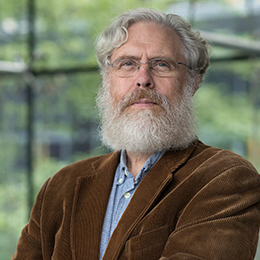
Director, NHGRI Center for Excellence in Genomic Science
Robert Winthrop Professor of Genetics, Harvard Medical School
Professor of Health Sciences and Technology, Harvard and MIT
Founding Core Faculty and Lead, Wyss Institute, Harvard University
Dr. Church is Professor of Genetics at Harvard Medical
School and Professor of Health Sciences and Technology at Harvard and the
Massachusetts Institute of Technology (MIT), a founding member of the Wyss
Institute, and Director of PersonalGenomes.org, the world’s only open-access information on human genomic,
environmental, and trait data. Dr. Church is Director of IARPA & NIH BRAIN
Projects, and Director of the National Institutes of Health Center for
Excellence in Genomic Science.
Dr. Church is known for pioneering the fields of personal genomics and synthetic biology. He developed the first methods for the first genome sequence & dramatic cost reductions since then (down from $3 billion to $600), contributing to nearly all “next generation sequencing” methods and companies. His team invented CRISPR for human stem cell genome editing and other synthetic biology technologies and applications – including new ways to create organs for transplantation, gene therapies for aging reversal, and gene drives to eliminate Lyme Disease and Malaria. He has co-authored more than 590 papers and 155 patent publications, and one book, “Regenesis”.
He has received numerous awards including the 2011 Bower Award and Prize for Achievement in Science from the Franklin Institute, the Time 100, and election to the National Academy of Sciences and Engineering.

Director, NHGRI Center for Excellence in Genomic Science
Robert Winthrop Professor of Genetics, Harvard Medical School
Professor of Health Sciences and Technology, Harvard and MIT
Founding Core Faculty and Lead, Wyss Institute, Harvard University
Dr. Church is Professor of Genetics at Harvard Medical
School and Professor of Health Sciences and Technology at Harvard and the
Massachusetts Institute of Technology (MIT), a founding member of the Wyss
Institute, and Director of PersonalGenomes.org, the world’s only open-access information on human genomic,
environmental, and trait data. Dr. Church is Director of IARPA & NIH BRAIN
Projects, and Director of the National Institutes of Health Center for
Excellence in Genomic Science.
Dr. Church is known for pioneering the fields of personal genomics and synthetic biology. He developed the first methods for the first genome sequence & dramatic cost reductions since then (down from $3 billion to $600), contributing to nearly all “next generation sequencing” methods and companies. His team invented CRISPR for human stem cell genome editing and other synthetic biology technologies and applications – including new ways to create organs for transplantation, gene therapies for aging reversal, and gene drives to eliminate Lyme Disease and Malaria. He has co-authored more than 590 papers and 155 patent publications, and one book, “Regenesis”.
He has received numerous awards including the 2011 Bower Award and Prize for Achievement in Science from the Franklin Institute, the Time 100, and election to the National Academy of Sciences and Engineering.
Journal article
Cancer metastasis is a major contributor to patient morbidity and mortality¹, yet the factors that determine the organs where cancers can metastasize are incompletely understood. Here we quantify the absolute levels of 124 metabolites in multiple tissues in mice and investigate how this relates to the ability of breast cancer cells to grow in different organs. We engineered breast cancer cells with broad metastatic potential to be auxotrophic for specific nutrients and assessed their ability to...
Journal article
DNA-PAINT (Points Accumulation in Nanoscale Topography) is a super-resolution microscopy technique capable of nanoscale imaging through the transient binding of fluorescently labeled imager strands to complementary DNA docking strands. Imager strands can be continuously replenished from an effectively infinite pool, making DNA-PAINT inherently resistant to photobleaching. However, extended DNA-PAINT imaging is limited by the formation of reactive oxygen species (ROS), which damage docking...